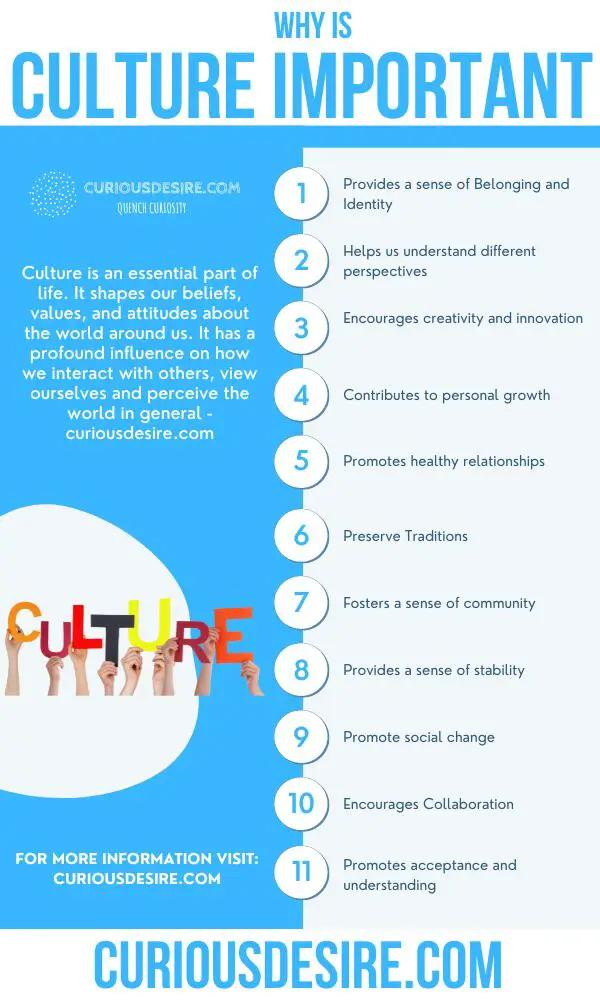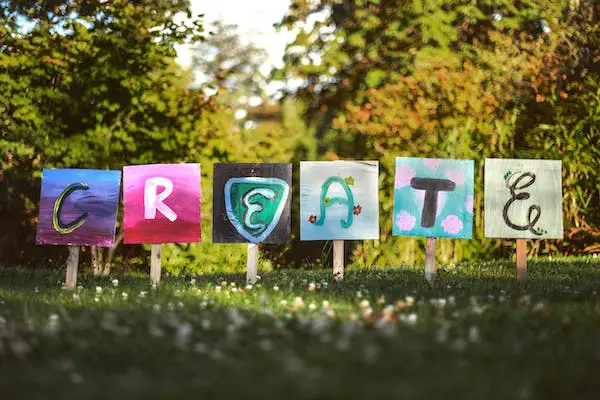Culture is an essential part of life. It shapes our beliefs, values, and attitudes about the world around us. It has a profound influence on how we interact with others, view ourselves and perceive the world in general.
But why is culture so important? In this article, we’ll explore 15 reasons why is culture important to society as well as individuals.
From providing a sense of belonging to fostering creativity and innovation, understanding the importance of culture can help us appreciate its value in our daily lives. So let’s dive into some of these reasons and see just how powerful culture can be.
15 Benefits of Culture in Our Life
Culture is a term that refers to a large and diverse set of beliefs, traditions, values, customs, behaviours, and artefacts that are shared by a particular group of people.
Following are some of the reasons why is culture important:
1. It provides a sense of belonging and identity
People from different cultural backgrounds come together to form a community, which helps us to feel connected and part of something larger than ourselves. This connection can be beneficial for individuals as well as groups by providing them with a shared purpose and identity.
Having access to a cultural community can be a great source of support and can help foster a sense of belonging. This sense of identity plays an important role in our lives, as it serves to remind us that we are part of something larger than ourselves.
It is not just about having the same background or beliefs; it is also about learning from each other and growing together.

2. It helps us understand different perspectives
Culture is constantly evolving, which means we are exposed to different ideas, values, beliefs, and customs. This allows us to gain insight into the ways other people think and act, giving us a better understanding of different perspectives.
The more we understand and appreciate other cultures, the more tolerant and open-minded we become.
3. It encourages creativity and innovation
Culture is often seen as a source of inspiration that can stimulate creativity in individuals as well as groups.
Through culture, we can develop a better understanding of different ways of thinking, problem-solving, and communication that are unique to certain groups. This allows us to connect with different cultures and gain insights into their values, beliefs and customs.
With this understanding, we are more likely to come up with innovative solutions, as well as more effective ways of working.

4. It helps us understand our history and traditions
Culture is a reflection of the values, beliefs, and behaviours that define a particular group of people over time. It gives us an understanding of where we come from, as well as the context for current events and trends in our society today.
By recognizing and understanding our history and traditions, we can begin to appreciate the unique culture of our own communities. This helps us gain a better understanding of how we got to where we are today, as well as the events that have shaped our society.
Understanding culture is not just about learning from the past but also looking towards the future. By understanding the importance of culture, we can begin to create a more diverse and inclusive society.
5. It contributes to personal growth
Culture can help us understand our own identities and beliefs better by providing us with the opportunity to explore different lifestyles and cultures.
Taking part in cultural activities or events can be an excellent way of learning new skills, broadening our horizons, and exposing ourselves to different perspectives. Attending cultural events can not only help us explore different cultures and traditions, but it can also expand our knowledge and understanding of the world around us.
For example, by attending a cultural festival, we can learn more about the history and customs of a particular group. This can help us become more tolerant and appreciative of different cultures.
6. It promotes healthy relationships
Having an understanding of different cultures and customs can help us to build strong, meaningful relationships with people from diverse backgrounds.
Knowing about a person’s culture can be extremely beneficial, as it helps us understand their values, beliefs, and expectations. This can be especially helpful in creating strong relationships and understanding how to interact with that person in any given situation.
By understanding the cultural background of a particular individual or group, we can gain insight into their worldview and learn how to communicate with them effectively. This can help us build strong, healthy relationships that are beneficial for everyone involved.
7. It is an important tool for conflict resolution
Having a solid understanding of different cultures can be helpful in resolving conflicts between individuals or groups from diverse backgrounds.
Understanding another person’s cultural values and beliefs can help us to better understand their motivations and expectations. This in turn, can be helpful in finding common ground, developing effective solutions, and working towards a peaceful resolution.
By recognizing the importance of culture, we can create a more harmonious society built upon mutual respect, understanding, and appreciation.
8. It helps preserve traditions
Culture is often used to preserve and pass down traditions from one generation to the next. Culture is an important part of how we identify ourselves and our place in the world.
Preserving cultural traditions helps us to keep our cultural heritage alive, which can be beneficial for maintaining a strong sense of identity and belonging. Cultural traditions help to create connections between generations, providing a foundation that ties us together as a group.
Cultural activities and events can also be an effective way of preserving traditions, as they provide us with an opportunity to experience the customs and beliefs of our ancestors. This helps us to stay connected to our past and better appreciate the culture of our own communities.
9. It fosters a sense of community
By understanding different cultures, we can gain a better appreciation for the diversity of our society. This can help us to foster a sense of community and belonging by breaking down barriers between people from different backgrounds.
Understanding culture can also be beneficial in creating strong bonds between members of a particular group or community. It can serve as a common ground that unites us, regardless of our differences. This can help us to build meaningful connections with one another and promote a sense of unity within our society.

10. It provides a sense of stability
Culture acts as a stabilizing force in our lives, allowing us to understand and adapt to changes and challenges. It can provide us with a sense of comfort and stability by providing us with a shared set of values, beliefs, and customs that can help guide our behaviour in any situation.
Culture serves as a bridge between different groups of people, providing a sense of stability and continuity even in the face of adversity.
By understanding different cultures, we can become more resilient to changes in our environment and better prepared to meet future challenges. This can help us create a more stable society that is able to persevere even in times of difficulty.
11. It can be used to promote social change
A culture is an invaluable tool for promoting social change and creating a more equitable, just, and inclusive society.
By understanding different cultural backgrounds, we can gain insight into the beliefs and values of different individuals and groups. This knowledge can help us challenge existing systems and create new frameworks that are more reflective of a diverse range of perspectives.
It can help create a stronger sense of unity within our society, allowing us to work together towards a better world.
12. It encourages collaboration
By providing us with an understanding of different perspectives, culture can help foster cooperation and collaboration between different groups.
By understanding cultures and the different perspectives that come with them, we can use this knowledge to our advantage. We can utilize cultural differences and similarities to encourage collaboration between different groups. Through this collaborative process, we can create better solutions and work towards a common goal.
This type of collaboration can lead to more creative ideas and innovative solutions and can ultimately help us to make progress towards a better future.
13. It promotes acceptance and understanding
Understanding our own culture as well as those of others, encourages tolerance, respect, and acceptance.
By understanding different cultures, we can learn to accept and appreciate our differences. This helps to reduce stereotypes and prejudices, promoting harmony within communities and beyond. Cultural understanding plays an essential role in creating an inclusive society where everyone feels accepted regardless of their background.
Through engaging with different cultural experiences, we can gain a better appreciation for our own culture, as well as those of others. This can help us to foster understanding and promote acceptance within our society.
14. It fosters an appreciation for diversity
The culture encourages us to appreciate and celebrate the differences between people, highlighting the unique qualities of each culture.
By gaining insight into diverse cultures, we can learn to recognize and accept the uniqueness of each culture and its people. This encourages us to appreciate diversity rather than seeing it as something to be feared or resisted.
This appreciation for diversity helps create a more welcoming atmosphere for all members of society, promoting acceptance and understanding among people from different backgrounds.

15. It is a tool for economic development
By promoting cultural tourism and investing in cultural heritage, countries can generate economic growth and create jobs. Furthermore, cultural products such as art and music can be used to attract tourists or investors, helping to boost the economy.
They offer a unique insight into the culture of a particular region, providing visitors with an immersive experience that is both educational and entertaining. This can help stimulate economic growth, create jobs, and generate revenue for local businesses.
Cultural heritage can also be used to preserve a sense of identity and pride within communities, giving them something to protect, nurture, and cherish.
16. It promotes peace and unity
Through cultural exchange, people from different backgrounds can come together to find common ground.
By engaging in cultural exchange, we can gain an understanding of different perspectives, experiences, and worldviews that can help us to work together towards a common goal. This helps create a sense of solidarity and connection across different communities and cultures, which can be beneficial for promoting peace and unity.
Though it is easy to focus on the differences between cultures, understanding and celebrating the similarities can be just as important. This can help to foster a greater sense of peace and unity, helping create connections that last for generations.
17. It contributes to our overall well-being
Having access to cultural activities gives us the opportunity to experience joy and fulfilment in our lives. It also helps to reduce stress, providing us with a sense of purpose and connection that can have positive benefits for our overall health.
Research has shown that engaging in cultural activities can help people better cope with anxiety and depression, as well as reduce stress levels. By connecting with our culture, we are able to experience a sense of belonging and connected
Culture plays an important role in our lives, allowing us to find meaning and purpose. It can also be a powerful tool for promoting understanding and collaboration between different people and groups. By appreciating and respecting the cultures of others, we can create a more inclusive world.
Conclusion
Culture contributes to our lives in many ways, from providing us with a sense of stability and belonging to fostering an appreciation for diversity. It can also be used as a tool for economic development and global understanding, helping to promote peace and unity.
By appreciating and respecting the cultures of others, we can create a more inclusive world. Ultimately, culture helps to enrich our lives and bring us joy and fulfilment.